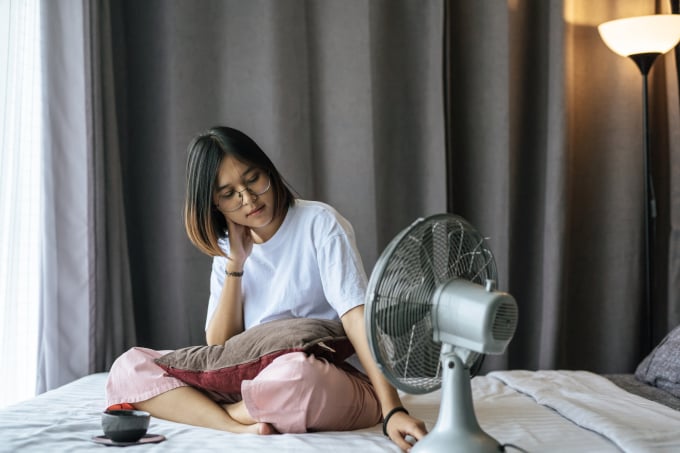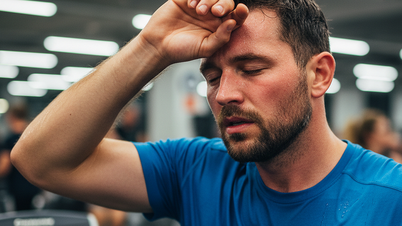Circulating air from fans can dry out the mouth, nose, and throat, leading to excess mucus production.
Turning on a fan at night helps keep you cool while you sleep, circulates the air, and reduces stuffiness. However, it can be harmful to many people, such as those with allergies or sensitive to surrounding noise. Here are the harmful effects.
Allergic reaction
Fans move air around the room, creating dust mites. People with allergies or asthma may experience worsened symptoms if they sleep with a fan on overnight.
Dry air
The constant flow of air blowing on the body can cause dry skin. Some people also sleep with their mouths open, which can cause dry mouths and throats. People who sleep with their eyes half open may also experience itchy, dry eyes upon waking.

Fans can spread dust and allergens. Photo: Freepik
Sinus irritation
Airflow also tends to dry out nasal passages, which can affect your sinuses. If your dry mouth is severe, it can cause your body to produce more mucus to compensate. You are then prone to congestion, stuffy nose, and sinus headaches.
Add noise
Some people may find the sound of a fan annoying and distracting. A 2014 study from the Barzilai Medical Center in Israel found that noise levels as low as 33-48 dB can have a noticeable impact on sleep. Meanwhile, some cheap or poorly designed air conditioners are louder, around 50-60 dB.
Scientists theorize that environmental noise at night can easily affect hearing and lead to insomnia. This causes daytime sleepiness and fatigue, irritability, mood swings, and reduced health and cognitive performance.
In addition to the above risks, the habit of sleeping with a fan on all night can also lead to muscle pain. This is because cold air circulating near the body can cause muscle contraction and make the muscles tense and cramp.
To reduce the side effects of sleeping with a fan, everyone should keep their house clean and clean regularly to remove dust from the fan blades. Use an air purifier with a HEPA filter to limit the spread of dust mites, pet hair and other allergens. In addition, you can equip a dehumidifier to remove excess moisture in the air.
When sleeping with a fan, set the timer to turn off after 1-2 hours. This will help keep the room cool while you sleep, but prevent dry air from circulating throughout the night, reducing the risk of drying out your skin, eyes, and sinuses. Avoid placing the fan in one place or too close because it can easily cause the wind to come into direct contact with your body. Instead, place the fan 1 meter from the bed and set it to oscillation mode.
Huyen My (According to GoodDrX, Sleep Foundation )
| Readers ask questions about ear, nose and throat diseases here for doctors to answer |
Source link



![[Photo] Keep your warehouse safe in all situations](https://vphoto.vietnam.vn/thumb/1200x675/vietnam/resource/IMAGE/2025/10/1/3eb4eceafe68497989865e7faa4e4d0e)
![[Photo] Hanoi morning of October 1: Prolonged flooding, people wade to work](https://vphoto.vietnam.vn/thumb/1200x675/vietnam/resource/IMAGE/2025/10/1/189be28938e3493fa26b2938efa2059e)

![[Photo] President of the Cuban National Assembly visits President Ho Chi Minh's Mausoleum](https://vphoto.vietnam.vn/thumb/1200x675/vietnam/resource/IMAGE/2025/10/1/39f1142310fc4dae9e3de4fcc9ac2ed0)






















































































Comment (0)